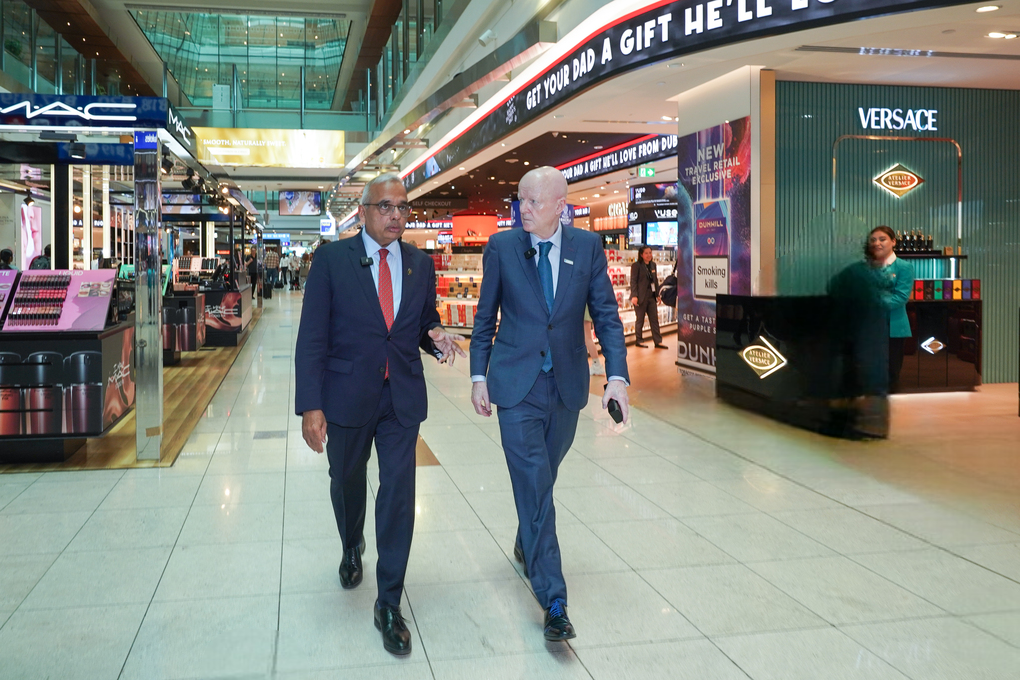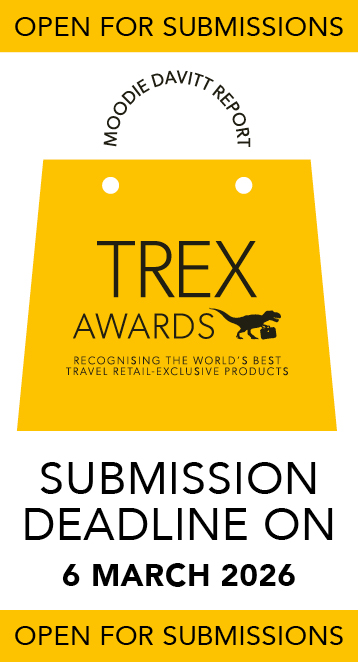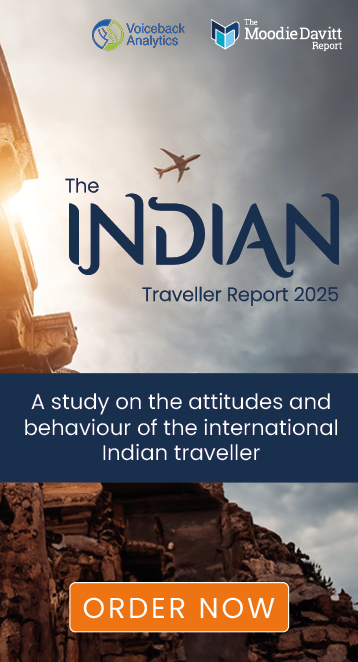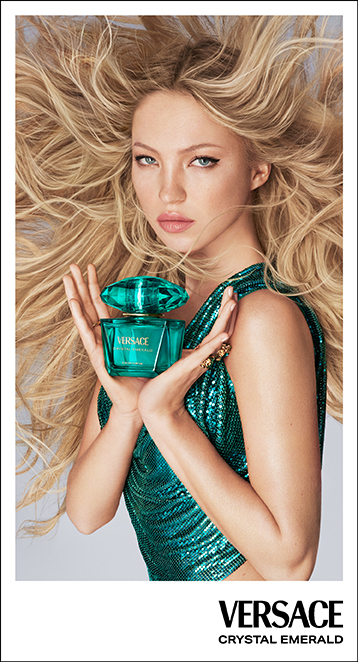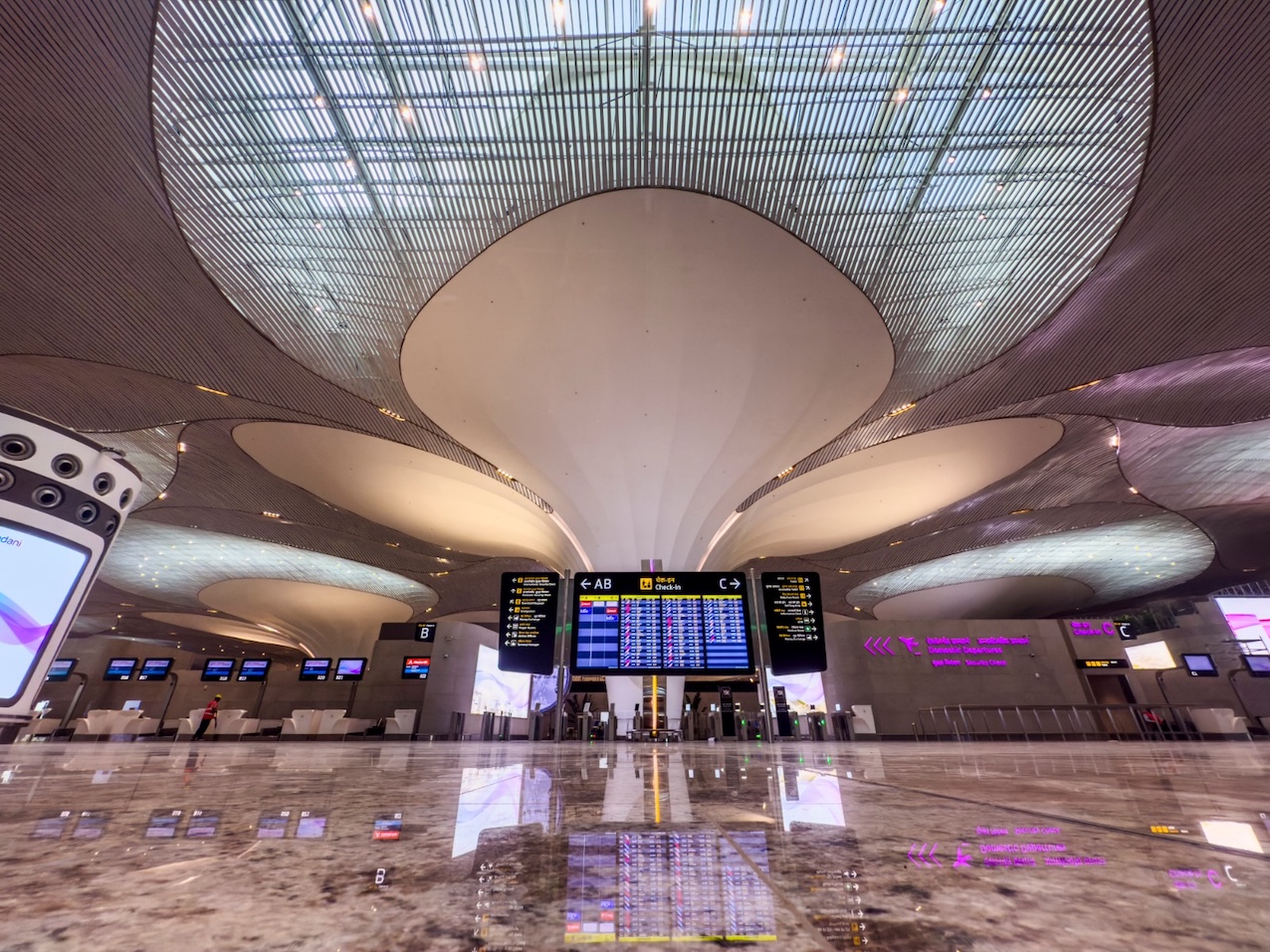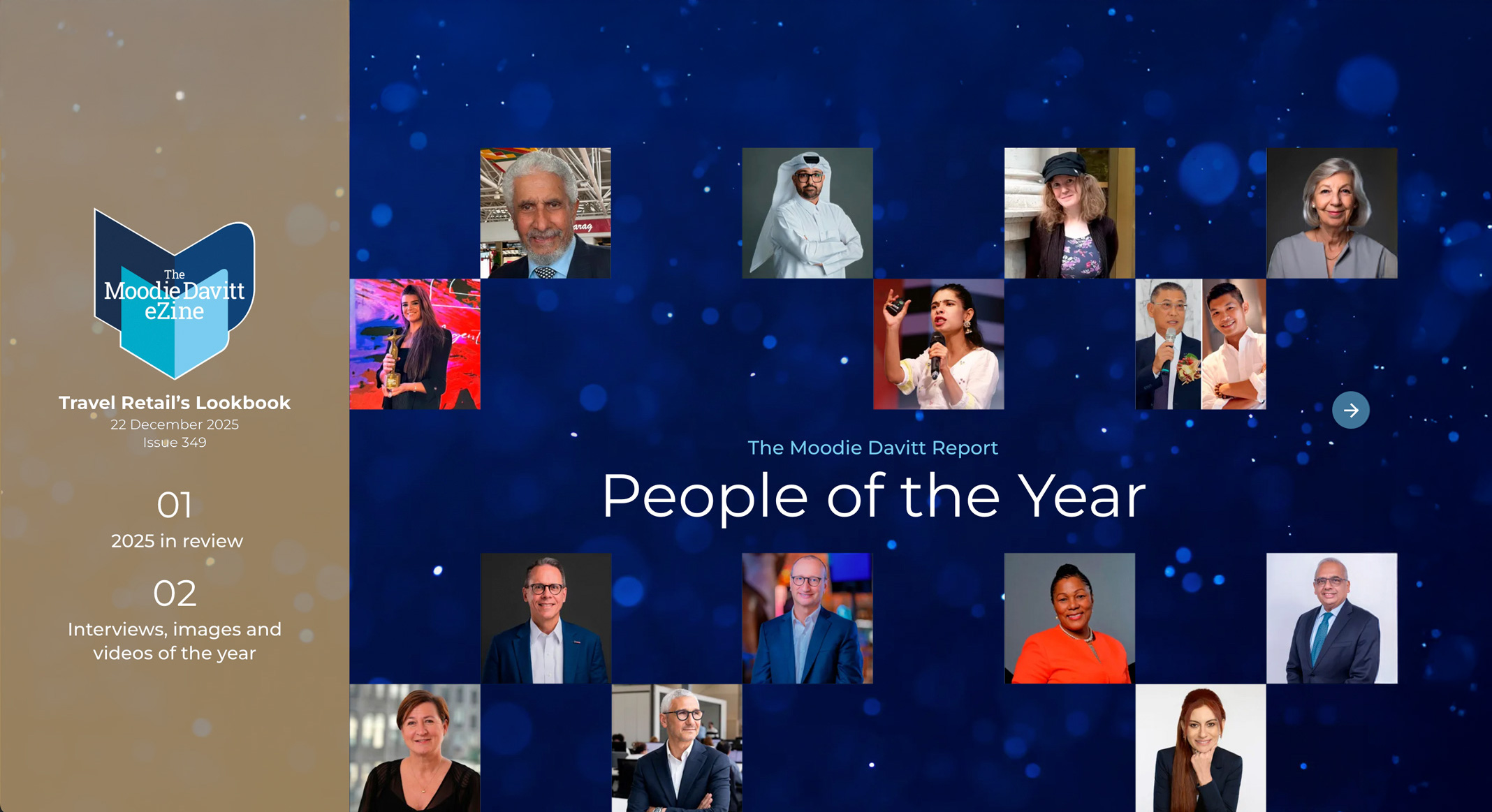
Prologue: On 1 June, Ramesh Cidambi, long-time Chief Operating Officer at Dubai Duty Free, took over executive leadership with his promotion to Managing Director.
Remarkably, he becomes only the second leader of the world’s biggest travel retailer in a single airport since its inception in 1983, stepping into the giant-size boots of his legendary predecessor Colm McLoughlin.
Cidambi is well-booted, well-suited and well-prepared for that challenge. He has, after all, served the company with much distinction since 1988, the past eight years as Chief Operating Officer. As anyone who has seen him on stage at The Trinity Forum or other industry events will avow, he is as articulate as he is insightful, an astute reader of people as well as retail trends and performance.
Cidambi is self-effacing about himself and the business, declining to gloss over what he sees as challenges and even shortcomings. He insists Dubai Duty Free can and must do better in certain areas, particularly in the face of intense local and international domestic and airport competition.
With both penetration and spend relatively soft, especially in relation to the rapid passenger growth at Dubai International Airport (DXB), he believes challenges must be identified and addressed in the short, medium and long term for the good of the Dubai Duty Free business.
The Moodie Davitt Report Founder & Chairman Martin Moodie flew to Dubai this month to talk to Cidambi about his priorities in the months and years ahead, his philosophy on life and business, his thoughts on his renowned predecessor and much more. They also walked the new-look Concourse B liquor & tobacco stores at Dubai International Airport, film coverage of which we will bring you soon.
What follows is a compelling and rarely candid exchange that suggests while the transition at the top of this renowned travel retail juggernaut is indeed a profound moment, it is also one that leaves Dubai Duty Free in eminently capable hands.
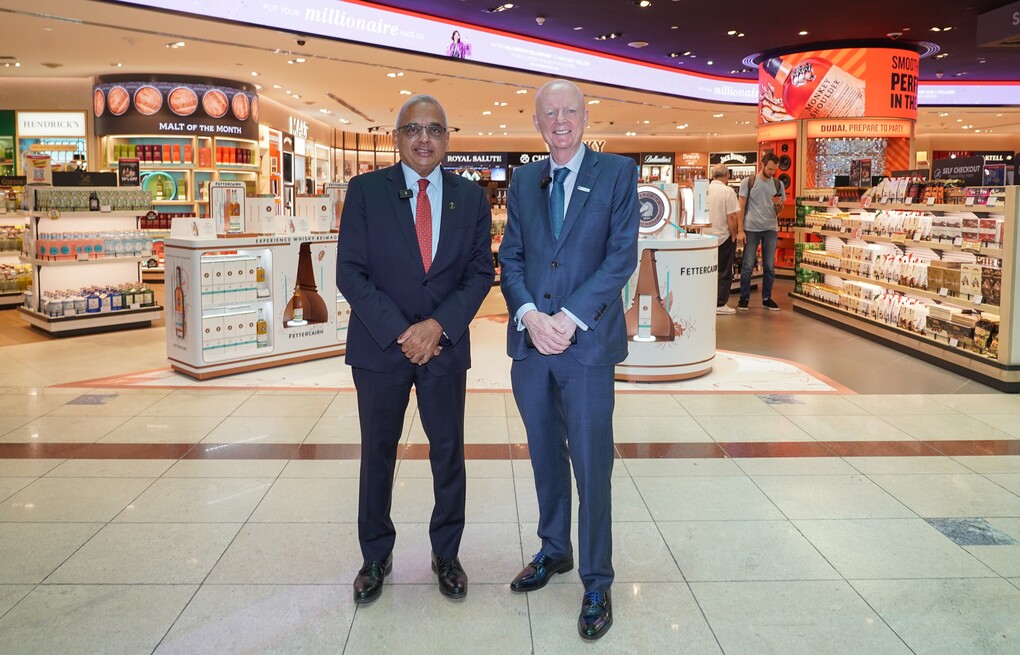
The Moodie Davitt Report: Ramesh, these are obviously profoundly important days for Dubai Duty Free. It is the world’s biggest duty-free retailer in a single airport and there has just been a change of leadership after many, many years. Tell us about the significance of the moment both for you and the organisation.
Ramesh Cidambi: Significant would be an understatement. It’s an extremely significant moment for the organisation, because we have been led by Colm since December of 1983 until May of 2024. So the organisation has effectively known only one leader for over 41 years. So for me, it’s both a privilege and a responsibility to take over the role from 1 June.
The thing that stands out most is the sense of responsibility that you have for an organisation that has grown and become enormously successful over four decades, and has 5,854 people working for it. So I’m playing an important role in the services that are offered to passengers at Dubai Airport.
To go from Chief Operating Officer to Managing Director the shift is very subtle but also very powerful in terms of the responsibility part. The actual content in terms of the work is similar to what I was doing before but in terms of responsibility it is not.
So you do have the sense that if things are happening around you, they are happening because you let them happen. And if things are not happening, then that’s because you’re not letting them happen.
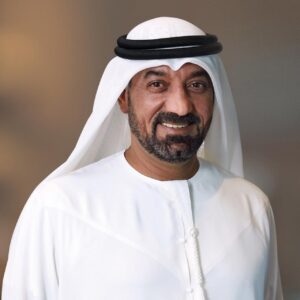
It is also an extraordinary honour and privilege to report to His Highness Sheikh Ahmed bin Saeed Al Maktoum and to work for an organisation of which he is the Chairman. He is someone who has responsibilities across the entire breadth of the economic landscape of Dubai and who is very keen to help and support Dubai Duty Free in the next phase of its growth and development.
That is truly an enormous privilege to have. So responsibility and humility are the two things you think about most when you step into a job like this.
And no doubt great personal excitement. After all, we’re not talking about any travel retailer here but one of great scale and heritage. And one that plays an integral role in terms of Dubai tourism, the local economy and the marketing of Dubai globally.
Absolutely. The word iconic is overused but I would say that in a Dubai context we are an iconic organisation. Full credit to Colm in terms of developing that part and positioning Dubai Duty Free as an organisation that has been integral to the development of Dubai as a leisure and business destination.
In the eyes of people in Dubai, I would say Dubai Duty Free has occupied a much more prominent role than simply what our turnover is. That is the heritage of the company.
We are very fortunate that across a wide spectrum of the population in Dubai, and across many of the travellers who pass through the airport, there is goodwill and a positive perception about the organisation. And that’s what we need to nourish and develop further as time goes.
Because our ethos from the beginning has been that we want to provide a first-class service to passengers using the airport. We didn’t set out to become the world’s biggest duty free in a single location. Being a place which offers top service and convenience to passengers in an attractive environment was always a fundamental part of our ethos from when the company was built.
So I think that is why there is a sort of love and affection from a large number of people who use the airport and go to the duty free. The flip side of that was during COVID, when we shut down the airport on 25 March 2020 and we reopened the shops on 3 June, there were a few flights that went through in the interim period.
Before we reopened the shops and even after we started the reopening but had not opened all of them, people would send me pictures of our freestanding units and merchandising covered up with shrink wrapping and say, “Oh, we’re so sad that the duty free is not open.”
So I think we have touched the hearts of many people in the course of four decades under Colm’s leadership. And that is really borne out by the kinds of messages that we got when times were really dark and the kinds of messages that we get when things are going well.
You’ve also given back into society – societies, plural – on so many occasions. There is the employment factor, the economic contribution, the amplification of what Dubai is to the world. There are multiple functions that you don’t see in a pure play retailer very often around the world.
Absolutely. It was also complementary. The more we talked about Dubai and Dubai Airport; the more we invested in sports sponsorships and other things and spread the Dubai name; the more we attended conferences and events; the more people were reminded about Dubai and reminded about how attractive, safe and stable a city is… all helped enormously by the growth and development of Emirates airline.
Any successful organisation like Dubai Duty Free has many reasons for success, from the Chairmanship of Sheikh Ahmed bin Saeed Al Maktoum to Colm’s leadership over four decades to each and every one of our 5,854 employees and so on.
The challenge for the management team and for the wider team is that we aren’t doing our job if we simply think of ourselves as people who are just captive to what is happening around us – Ramesh Cidambi
But equally, the growth of the airline has played a fantastic part in developing the airport and marketing Dubai as a destination. The Emirates logo is so well-recognised in so many markets across five continents. That was hugely beneficial.
So we were able to take advantage of the thousands of people who were coming. Part of the reason I say that is because it’s also important for us that now the airline has been so successful and now the airport has been so successful in becoming the world’s largest airport for international passengers – which is full credit to Paul Griffiths and the team at Dubai Airports – that Dubai Duty Free, then does a better job of converting those passengers into customers and encouraging people to shop more and to spend more.
So in the next phase of our development, we also need to focus on penetration and spend. Because the marketing of Dubai and the marketing of the airport and the airline has been so successful. Which we see from the 240,000 passengers who use the airport every day. So there’s no shortage of passengers, now. We’re serving 91 million pax. That’s pretty good.
It would be remiss of me in an interview such as this if we didn’t touch on Colm, whom you’ve worked alongside since 1987.
He’s an extraordinarily charismatic person with a great eye for detail, a fantastic memory, and great enthusiasm to come to work every day. He was fearless and lead from the front during COVID. He was never one of those people who just stayed at home during the crisis.
He went to the shop floor and walked the shop during COVID as many times as I did. It was a testament to his energy and to his drive and his motivation.
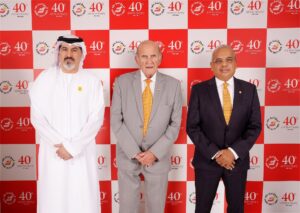
He’s held in great affection by all of us in the company, because of what he did for the Government of Dubai in terms of developing Dubai Duty Free. And how he has influenced and helped and allowed so many of us to develop, to flourish, to start families, to see children go to college, to see kids get married.
So it has been four decades of looking after a large group of people with impeccable integrity. He has provided an extraordinary service to the Government of Dubai and to the airport.
Very well said. I know it’s early days so I’m not going to press you too much in detail about your plans. But I would like to know what your early priorities are and if we can expect any kind of shifts?
In terms of priorities, we have to balance the short term considerations and the medium and long term considerations.
So in terms of short-term considerations, we have to focus on sales. That’s the metric that we are judged against. At the end of May for the year to date we’re just about at budget but the trend has been downwards. But the gap in the month of May between the passenger growth and sales growth was the widest that I can remember.
If you say time started on 2 June 2020, when we reopened the shops, and we tracked our performance to today, I have not seen this kind of divergence that we had in May.
So it’s important for us that we close the gap between the passenger growth and the sales performance. Because the passenger growth is there… it is in high single digits and it has been consistent in each month of the year. But when we started the year the passenger growth and sales growth was equal, and by the time we got to May it was a divergence of 11-12%
So the first and most important priority is to look at each and every category; to look at all the locations that we are in; to look at each of the 5,800+ employees that we have.
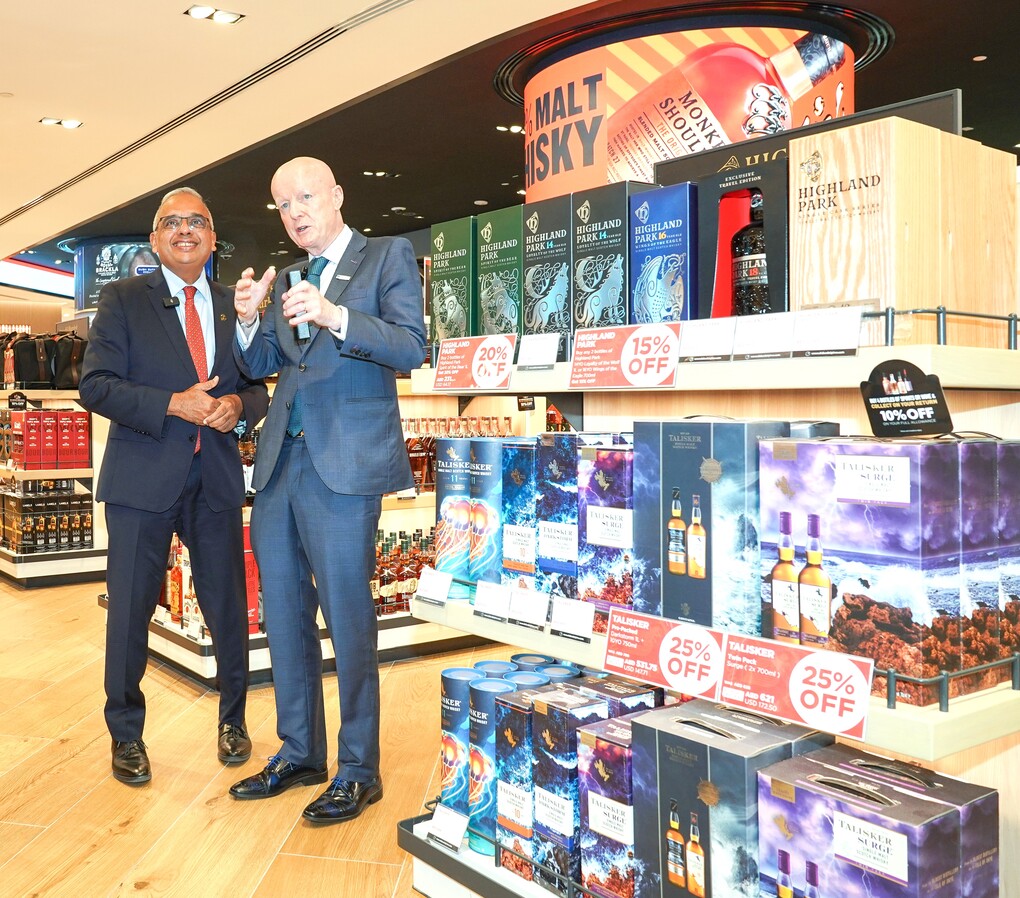
Michael [Schmidt – Dubai Duty Free Senior Vice President – Retail] put together a programme at the beginning of the month, where each and every employee was met. Each and every employee was given feedback in terms of how they were doing against the budget and so on.
It is important to sort of touch each person, because in the end it will be the 5,800+ employees who will improve the business, or it will be the 5,800+ employees who will watch the decline of the business. In that sense, it’s simple.
I’m happy that at least in the first ten days of June the trend has reversed a little bit, and the gap is less by about two percentage points – it is now 9% between sales and passenger growth.
The penetration has also improved – the penetration gap compared to last year was two percentage points, now it is less. The gap in terms of spend per passenger compared with last year reduced in June compared to May.
Plus I’ve spoken to the entire management team, and anything that we can do to reduce waste and to reduce costs to improve the bottom line is also a priority.
In the medium term, the priority has to be to look at your processes: to look at the way that you do different things and to look at new ideas and initiatives.
We started a programme for the management team to come up with ideas and suggestions in terms of what we can do. What quick wins can we get? What are the things we can do in the medium to long term? I’m very pleased with the response.
So in the medium term, we have to look at all those ideas and solutions; discard many, keep some and see how we can improve the business and continue to invest in the retail offer.
Investment in the retail offer is absolutely important, irrespective of the hit you take in terms of disruption. Any time we renovate something in a 24-hour environment the trading never stops, and you can’t really close a store for renovation. Like for example, we renovated Concourse B liquor and tobacco east and west, which we will take a look at later.
The sales drop can range from -20 to -25% to -50% for the period that renovation is in progress, because the retail offer is not great. It’s congested, passengers are bumping into each other, there are hoardings. So it’s impossible to provide the retail offer that the passenger expects while the renovation is in progress.
But you have to do it in order to keep the retail offer fresh. The other important aspect is obviously the marketing to the consumers and the use of digital marketing and doing anything that we can to improve penetration and spend in the long term.
In the long term, our future is obviously linked to the development of Al Maktoum International Airport. So in our minds, we think that if Al Maktoum happens around 2032 to 2033 we have about eight years in DXB.
So the challenge during the next six to eight years will be how to keep things fresh; how to continue renovating and refurbishing the offer and continuing to invest in DXB while we’re really engaged and focused on the development of the new airport.

Because we know from the opening of Concourse B in 2008, Concourse A in 2013 and Concourse D in 2016 that in each of these developments early intervention and early input to the architects and designers led to better and better retail offers.
Because no matter how good you are as a retailer, you cannot really compensate fully for architectural drawbacks or problems of flow within a retail area; problems in the passenger journey; and retail spaces being away from the main passenger flow. Concourse D was probably the best expression of that. We intervened early – three or four years before the opening of the concourse – and had a fantastic walkthrough retail offer.
The area where we could have done better in Concourse D would obviously be fashion, and we are trying to fix that situation. But if you don’t think of individual categories but simply think of a passenger going through the airport, every passenger has to go through the retail area, and everyone is oriented within an instant when he enters the areas as to where the retail offer is.
You have liquor and tobacco to the left, perfume and cosmetics to the right, and gold in front of you, so the passenger is oriented immediately. So the penetration in Concourse D has always been higher than A, B and C, just because of the spatial organisation of that concourse.
Obviously any project like Al Maktoum International Airport will have a variety of constraints and objectives which go into the design of the building. The building is not designed just to have Dubai Duty Free in it. And so you have a multiplicity of factors that must be taken into consideration.
But we hope that if we are engaged, focused and spend the time that is required on that project, then the returns in the next two or three decades will be extraordinary. Especially if we use all the knowledge that we have gained in terms of how to plan and how to execute retail areas with an airport. We have learnt a lot from Concourses A, B, C and D.
Tell me about the gap between traffic growth and penetration in terms of what you can control and what you can’t control, Ramesh. Because you didn’t suddenly become a bad retailer, you didn’t suddenly become a less efficient or less attractive one. A lot of this is down to factors that are out of your control – the lack of Chinese passengers; a softening spend among the Chinese and some other nationalities. How’s that balance of what you can turn around through innovation, ideation and hard work and the fact that the world’s simply a troubled place right now.
Absolutely. In any situation like this, both sets of factors contribute. But I always say you should leave the excuses to the bosses.
So if you wake me up at three in the morning and you give me eight excuses for what is going on, yes I can recite them and rattle them off.
But the challenge for the management team and for the wider team is that we aren’t doing our job if we simply think of ourselves as people who are just captive to what is happening around us – the macro-economic factors; the changes in terms of behaviour of, let’s say, the Russian consumer or the Chinese consumer. Or any of any of those things such as the economic factors in China and the greater availability of goods in Russia.
All of these things definitely impact spend. So if the Chinese passengers, for example, doubled between 2023 and 2024, and your sales only went up by +25%, then you have to say that the sentiment has changed with Chinese passengers. Because your retail offer and your retail pricing has not changed significantly between 2023 and 2024.
Yes, the airport is slightly busier, but it’s not that the airport was at 50 million pax in 2023 and is at 90 million pax in 2024. So if the spend is significantly lower in 2024, then there are other factors at play.
The challenge for all of us in the team is to do everything that we are doing a little bit better. So that we can better mitigate the effect of economics or availability or a particular crisis in a particular geography or whatever happens.
Some of it is also competitiveness. For example, we find that the Indian duty-free operators have become more competitive, better at communicating with the passengers, better at promoting their offers, better in attacking categories like alcohol, which is very important to them.
This is coupled with a general increase in availability of brands in the Indian domestic market.
Dubai Duty Free 10-15 years ago was seen as a place where an Indian consumer could access brands which he could not access in the domestic market or an Indian airport. But today, he doesn’t need Dubai Duty Free to access those brands. He can buy Dior perfume in Delhi in the domestic market or he could buy Dior perfume from us. We are competing with the domestic market in India and with better airport retailing there.
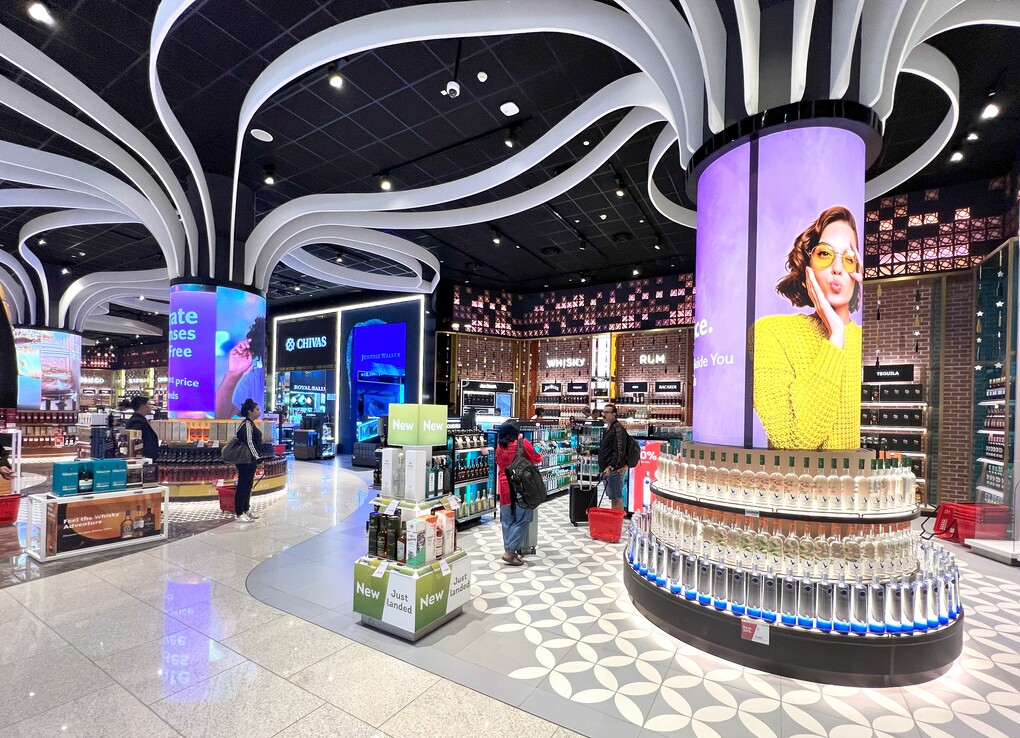
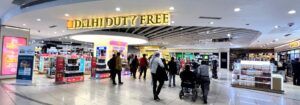
So it’s a question of do you have agency or do you not have agency? You have to approach a problem like this to say that you have agency, drive, determination and levers that you can pull to make the changes you want.
So you’re going to look at that departing Indian passenger from DXB versus the arriving Indian passenger in say Delhi, Mumbai, Bengaluru, Cochin or Hyderabad and you’re going to say, “OK, I’m going to really work harder to make sure that wallet is open here and not there.”
Absolutely. And in the Dubai domestic market we have competition from the domestic retailers, both in categories like alcohol – where there was a significant change in terms of licensing and so on – but also in other categories where the domestic retailers in Dubai are fantastic. There’s no other word for it. Dubai Mall announced a major expansion. Space is at a premium and the brands that are there are doing extremely well. The footfall is fantastic. The same with Mall of the Emirates.
Anyone will admit that the retail experience in the Dubai domestic market is fantastic. So where we are relatively space constrained and have a wide range of categories to look after – we are not just a fashion retailer – it is challenging to provide an experience in certain categories which is comparable to that of the domestic market. That’s a challenge that we have to live with, for those retailers are a force to be reckoned with.
What do you think will be the key dynamics to shape the next few years for Dubai Duty Free? Besides working hard to become a better more innovative, alluring retailer, are there other factors at play, that will be improve, help and shape you?
I think the digital side of things is hugely important. The more you can talk to individual consumers and the more you can establish a relationship with them, the more effective you’re going to be in communicating what your offer is.
And the earlier you can do it…
Yes, and the earlier you can do it within the journey. So I think cooperation with the airlines is going to be extremely important. It always was important but we were sort of start/stop in terms of efforts to engage or to work with people like Emirates Airlines.
And that’s partly the curse of growth, right? In that if you have high single-digit or double-digit growth, whether you do certain things great or if you don’t it’s not going to affect you much.

I was saying in a radio interview that nothing focuses the mind more than being below budget when it comes to sales. So there’s a greater desire and a greater sense of urgency in terms of working with other partners, not just airlines.
I think from a Dubai Duty Free sense, we also want to work more closely with Dubai Airports. So that there is less fragmentation of the retail offer, less confusion to passengers in terms of what the retail strategy is, and a more harmonious relationship with Dubai Airports, in terms of providing a high level of retail excellence across the board in the airport.
The relationship with the airport and the airline is very important. As is managing the twin demands of the need for investment in Al Maktoum International Airport, which as you have seen in the press is a US$35 billion investment.
Dubai Duty Free has historically contributed in great measure to the development of DXB and its facilities. So there will be an expectation that Dubai Duty Free plays a role in helping the development of Al Maktoum International Airport, but equally Dubai Duty Free also needs to invest and continue to keep the offer fresh in DXB.
So the twin challenges in the next few years will be complicated. A passenger who’s going through DXB doesn’t really care that you have a problem of developing a new airport eight or nine years from now.
For him the experience that he has at DXB is the experience that counts. So maintaining a high service level at DXB in the retail and non-retail areas whilst you are thinking about Al Maktoum will be a challenge for all of us.
And as the airport gets closer and closer to its design capacity, there is more queueing, there is less dwell time, there is more aggravation. So one of the concerns that we have is that once you get past beyond, say, 94-95 million pax and you get closer to 100 million, will the overall experience be such that the willingness of a passenger to shop is somehow reduced because of the overall experience of being in a busy airport?
That will be a challenge for the next few years if the growth in passenger numbers continues at the single-digit rate.
You and I will see some newness later today when we visit the revamped Concourse B liquor & tobacco stores but any other retail plans in the relative short term you can tell us about?
Yes, we have a lot of plans that will take us now effectively until the end of next year. We finished doing the liquor & tobacco shops in Concourse B East and West in April and May, which you will see when we go to the shop floor.
We have already started the renovation of the arrivals shops in terminals one, two and three.
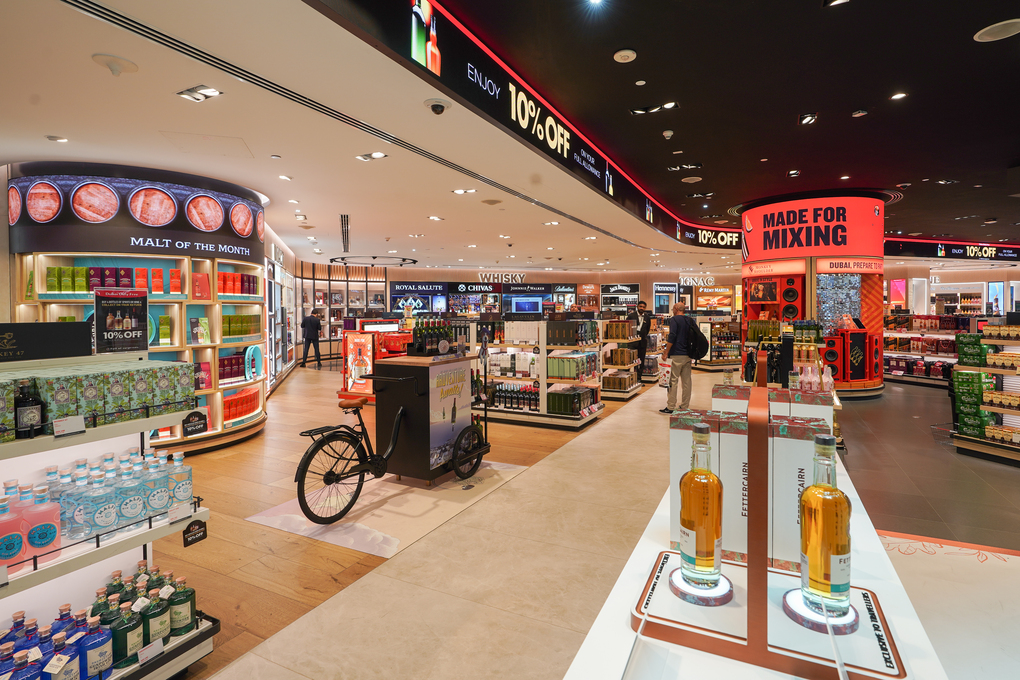
In Terminal 3, we have a big 1,200sq m arrivals shop on the right-hand side which has effectively been the same since the terminal opened in 2008. So the shop is dated and it has been performing at a lower level than the new shop we have on the left-hand side. The left-hand side shop is really best in class in terms of arrivals duty free and the liquor offer. It is a fantastic shop. So we want to provide the same experience to the passengers who go to the right-hand side, especially as historically more people tend to enter the right-hand side of the shop than the left.
So 50% of that shop is currently hoarded and the work in progress has impacted the sales by almost -50%. But that’s something that we have to deal with.
The Terminal 2 arrivals shop, which though small is very important, is also under renovation. The Terminal 1 arrivals shop, while again relatively smaller at 600sq m, is very important and that’s also under renovation.
With all three shops our objective is to try to attract people into the shop and get them to buy something because the penetration in arrivals stores for us has historically been in single digits.
We need to change that. We need to push the number up especially as there’s so much competition with A+E (African and Eastern) and MMI in the domestic market and with the retailers in the northern Emirates. There’s also competition from departing airports in India for alcohol.
One way to fight against the competition is to improve your retail offer, which is what we’re doing with T1, T2 and T3 arrivals.
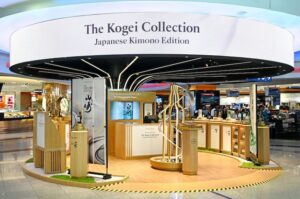
Then there is perfumes & cosmetics which is an extremely important category, and the only one other than cigarettes and [prize draw platforms] Millennium Millionaire and Final Surprise that was positive in the month of May.
The category is growing well. Perfumes & cosmetics together contributes about 22-24% of our business so we are doing a major renovation of the P&C offer in Concourse A. We will start that work towards the end of this year with a view to finishing it by the middle or end of 2025.
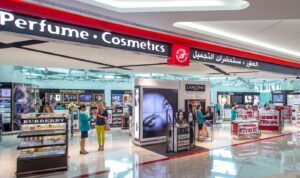
That’s a huge project because almost 97-98% of the P&C fit-out is custom fit-out by the brands. Managing a project like that in a busy environment in an important category in a phased manner and coordinating with multiple brands in terms of fit-out is challenging.
The other thing we are doing in Concourse A is renovating the Gifts from Dubai offer because we have traditionally not been happy with it. We felt that the offer had not evolved in line with all the other developments in Dubai. It was dated and therefore giving it a major refresh was very important.
Plus we are opening a Louis Vuitton boutique in Concourse A, which doesn’t currently have the brand, in the early part of next year. We’re now doing a full renovation of the Chanel boutique in Concourse A which is overdue and we are opening Cartier in Concourse A because we also don’t have a Cartier boutique there.
In Concourse B we are doing a swap of the technology and the watches offers to improve the offerings, especially luxury watches, and to also create space for two or three small boutiques. So that’s a major project.
Last but not least is the fact that the fashion offer in Concourse D is not on par with the fashion offer in Concourses A, B and C.
The passenger going through B, for example, has an opportunity to shop at Chanel, Louis Vuitton, Dior, Cartier and Gucci. But somebody going through Concourse D doesn’t have an opportunity to shop any of those brands.
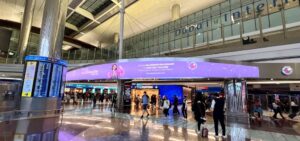
We have been mindful of that for a period of time. We went through multiple options in terms of design and in terms of locating these boutiques and we have a plan to achieve that by the end of next year.
We are also talking to the airport and seeing what opportunities with Dubai Airports there might be to work together in this area.
So all of these areas that I mentioned during this interview would add up to about 12,000sq m of retail space. That’s a significant amount of renovation for a retailer with over 40,000sq m of space. If you took the sales in all of these locations it would come to AED2 billion (US$554.5 million). So in terms of renovation and fit-out, it’s a significant investment when you do it at this scale, and in terms of impact on the business it is significant.
That’s a big chunk of your business.
It is. If we have a -10%, -20% or -25% hit as the renovation happens, it’s a significant amount of money in addition to the capex.
The point I am making is you need a certain amount of capex to renovate 12,000sq m but you also have to think of the impact on your revenue while the renovation is in progress.
So that’s why managing these projects over the next 18 months will be crucial in how we phase it and how we do it. But the desire and the commitment is there to make the offer better. And that is really the only way that you’re going to hold your own in terms of penetration and spend.
Absolutely. That capex may mean a hard short-term hit. But if you don’t do it, i.e., if you’re shy of innovation and investment and imagination, then ultimately you’re going to decline.
Yes, if you don’t keep the product fresh, you’re going to decline. Especially when other airports in the region and other retailers are upping the game.
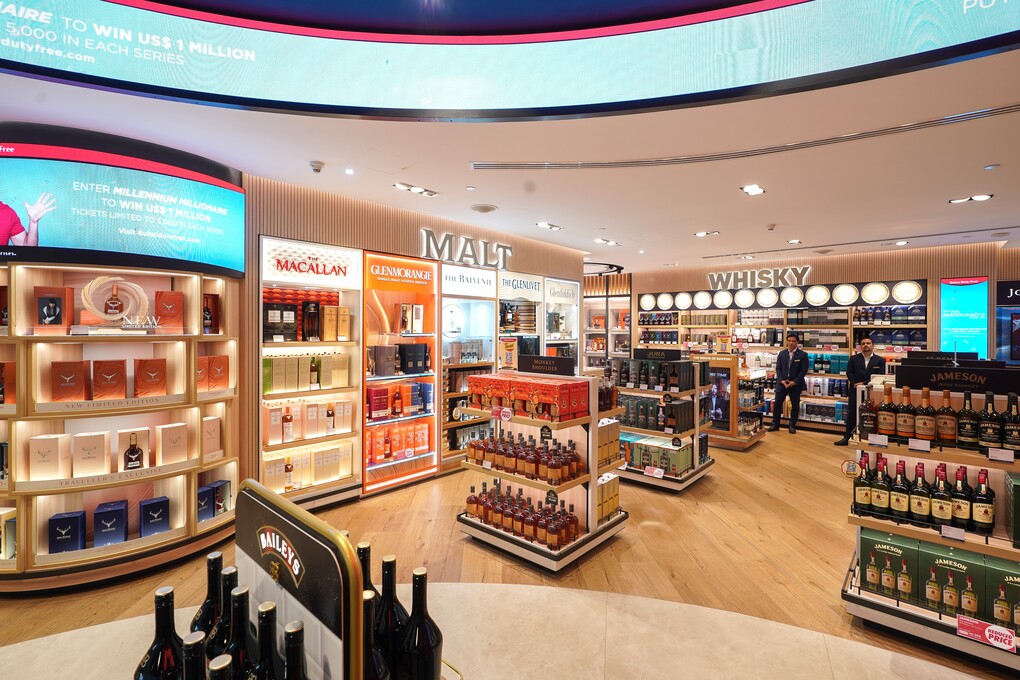
Ramesh, obviously, a lot of people know you already. But others don’t know the new leader of Dubai Duty Free. So just talk me through your abiding principles in business and in life. And also tell me about what Ramesh Cidambi does when he’s not working and leading Dubai Duty Free.
In terms of abiding principles, integrity and a strong work ethic are the most important things in our kind of business.
So you have to come to work every day, be prepared to work hard, and be prepared to serve the organisation, because ultimately that’s what you’re doing.
We can all have different titles, whether it is Managing Director or something else but that’s not the reason why you do what you do. The reason is because you have initiative, drive, determination and a strong sense of work ethic. And within that, I think integrity is very, very important.
Then you have other things like being dependable, being responsible and so on. So, for me, when I look at myself or when I look at other people, those are the things that would be important to me.
And you have to have good fortune, you have to have luck. There are any number of people who work hard, who are committed, who are dedicated, who have integrity, who are intelligent, whatever. They may be the attributes of doing well in your working career but luck is an important thing.
In terms of interests, reading has always been central to my life. Yoga and the practice of yoga has been extremely important as has fitness in general and sailing. So I have not deviated much from these three things.
And having the ability to really keep things in perspective in any situation. You can be overly optimistic, overly pessimistic, overly anxious. You can be careless and not be paying attention. So a balanced perspective in terms of how you look at stuff and the time you spend with your family, with your friends and doing different things… they are all extremely valuable.
It’s a cliché but one thing that COVID did teach us was the importance of face time, of connecting with people, of doing things – to celebrate the moments.
There’s a saying, ‘Death makes us all philosophers for a day’. The trick is to not just be philosophical for a day when someone dies but to keep the joy of capturing those moments through your day and through your working life.
What we have at Dubai Duty Free is a fantastic platform and organisation with a fantastic retail offer, great technology and processes. It has an amazing team of people with extraordinary levels of dedication at each part of the organisation.
Now, in this phase of our development, the question is ‘What will you do with it and what can you do to take it forward?’ What we have is really special but what we do with it is up to us as individuals and as a team.
You answered this to some extent with that comment, but any final message to the industry in this, your first interview since you assumed the role?
What I would say is that the industry really needs to make the retail offer in airports attractive and continue to provide value to customers.
Both these terms are overused – value to customers and attractiveness. Being relevant as a retailer – that phrase is also overused. But the danger is if we allow short-term considerations, short-term profit goals and general short-term thinking to make airport retailing irrelevant in the minds of passengers. That would be the biggest danger for retailers like Dubai Duty Free and for the 1,000 brands that we offer in our shops.
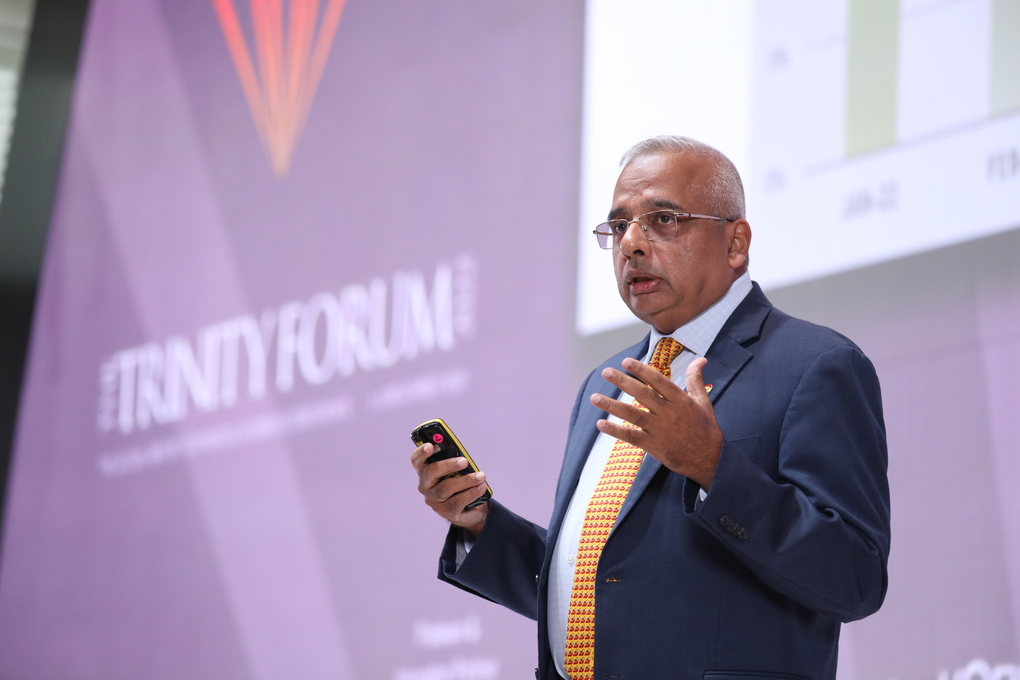
We didn’t talk much about the brands and our suppliers in this interview but they play an absolutely crucial role. Nobody knows their products better than the brands themselves. Nobody knows how to express themselves better in the retail environment than the brands themselves. Nobody knows customer perception of the brands, better than the brands themselves.
Nobody knows pricing and availability of the brands across different markets than the brands themselves.
So it’s really incumbent on both the brands and the retailers to be relevant for the next five years, ten years, 15 years. And that, I think, will be the abiding challenge for our generation. ✈





